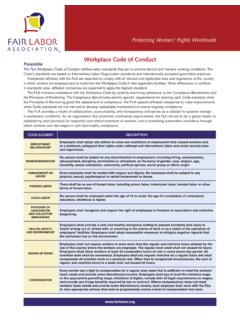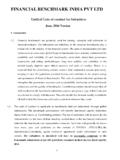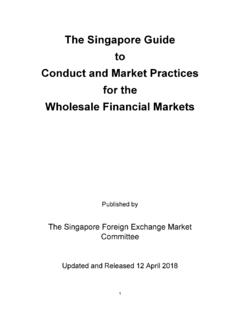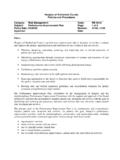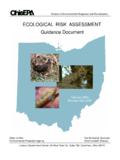Transcription of FLA Workplace Code of Conduct and Compliance Benchmarks
1 FLA Workplace code of Conduct and Compliance Benchmarks Revised October 5, 2011 2 TABLE OF CONTENTS PREAMBLE .. 3 FLA Workplace code OF 4 FLA Workplace code OF Conduct AND Compliance Benchmarks .. 5 I. EMPLOYMENT RELATIONSHIP (ER) ..5 II. NONDISCRIMINATION (ND) ..14 III. HARASSMENT OR ABUSE (H/A) ..17 IV. FORCED LABOR (F) ..19 V. CHILD LABOR (CL)..21 VI. FREEDOM OF ASSOCIATION AND COLLECTIVE BARGAINING (FOA) ..22 VII. HEALTH, SAFETY, AND ENVIRONMENT (HSE) ..26 VIII. HOURS OF WORK (HOW)..31 IX. COMPENSATION (C) ..34 GLOSSARY OF TERMS ..38 3 PREAMBLE The FLA Workplace code of Conduct defines labor standards that aim to achieve decent and humane working conditions. The code s standards are based on International Labor Organization standards and internationally accepted good labor practices. Companies affiliated with the FLA are expected to comply with all relevant and applicable laws and regulations of the country in which workers are employed and to implement the Workplace code in their applicable facilities.
2 When differences or conflicts in standards arise, affiliated companies are expected to apply the highest standard. The FLA monitors Compliance with the Workplace code by carefully examining adherence to the Compliance Benchmarks and the Principl es of Monitoring. The Compliance Benchmarks identify specific requirements for meeting each code standard, while the Principl es of Monitoring guide the assessment of Compliance . The FLA expects affiliated companies to make improvements when code standards are not met and to develop sustainable mechanisms to ensure ongoing Compliance . The FLA provides a model of collaboration, accountability, and transparency and serves as a catalyst for positive change in Workplace conditions. As an organization that promot es continuous improvement, the FLA strives to be a global leader in establishing best practices for respectful and ethical treatment of workers, and in promoting sustainable conditions through which workers earn fair wages in safe and healthy workplaces.
3 4 FLA Workplace code OF Conduct EMPLOYMENT RELATIONSHIP: Employers shall adopt and adhere to rules and conditions of employment that respect workers and, at a minimum, safeguard their rights under national and international labor and social security laws and regulations. NONDISCRIMINATION: No person shall be subject to any discrimination in empl oyment, including hiring, compensation, advancement, discipline, termination or retirement, on the basis of gender, race, religion, age, disability, sexual orientation, nationality, political opinion, social group or ethnic origin. HARASSMENT OR ABUSE: Every employee shall be treated with respect and dignity. No employee shall be subject to any physical, sexual, psychological or verbal harassment or abuse. FORCED LABOR: There shall be no use of forced labor, including prison labor, indentured labor, bonded labor or other forms of forced labor. CHILD LABOR: No person shall be employed under the age of 15 or under the age for completion of compulsory education, whichever is higher.
4 FREEDOM OF ASSOCIATION AND COLLECTIVE BARGAINING: Employers shall recognize and respect the right of employees to freedom of association and collective bargaining. HEALTH, SAFETY, AND ENVIRONMENT: Employers shall provide a safe and healthy Workplace setting to prevent accidents and injury to health arising out of, linked with, or occurring in the course of work or as a result of the operation of employers facilities. Employers shall adopt responsible measures to mitigate negative impacts that the Workplace has on the environment. HOURS OF WORK: Employers shall not require workers to work more than the regular and overtime hours allowed by the law of the country where the workers are employed. The regular work week shall not exceed 48 hours. Employers shall allow w orkers at least 24 consecutive hours of rest in every seven-day period. All overtime work shall be consensual. Employers shall not request overtime on a regular basis and shall compensate all overti me work at a premium rate.
5 Other than in exceptional circumstances, the sum of regular and overtime hours in a week shall not exceed 60 hours. COMPENSATION: Every worker has a right to compensation for a regular work week that is sufficient to meet the worker s basic needs and provide some discretionary income. Employers shall pay at least the minimum wage or the appropriate prevailing wage, whichever is higher, comply with all legal requirements on wages, and provide any fringe benefits required by law or contract. Where compensation does not meet workers basic needs and provide some discretionary income, each employer shall work with the FLA to take appropriate actions that seek to progressively realize a level of compensation that does. 5 FLA Workplace code OF Conduct AND Compliance Benchmarks I. EMPLOYMENT RELATIONSHIP (ER) Workplace code PROVISION: Employers shall adopt and adhere to rules and conditions of employment that respect workers and, at a minimum, safeguard their rights under national and international labor and social security laws and regulations.
6 Compliance Benchmarks General/Human Resource Management Systems Employers shall have in place written policies and practices and maintain proper and accurate records governing all aspects of employment from recruitment, hiring and probation, including written terms and conditions of employment, job descriptions, administration of compe nsation, and working hours for all positions, through to retrenchment and termination processes. Employers shall assign responsibility for the administration of human resources to a clearly defined and adequately qualified staff member or staff members and ensure workers at all levels receive communication and training about existing policies and procedures or any revisions. Employers should implement a regular review process of policies, procedures and their implementation in a consultative manner and amend when warranted. General/Documentation and Inspection Employers shall maintain on file all documentation needed to demonstrate Compliance with the FLA Workplace code and required laws.
7 Employers shall make these documents available to third-party assessors commissioned by the FLA and shall submit to inspections without prior notice. All notices that are legally required to be posted in the Workplace work areas shall be posted by employers. Recruitment and Hiring/Employment Decisions All employment decisions shall be made solely on the basis of a person s qualifications, in terms of education, training, experience, demonstrated skills and/or abilities, as they relate to the inherent requirements of a particular job. Employment decisions shall not be made on the basis of gender, race, religion, age, sexual orientation, nationality, political opinion, social group, ethnic origin, marital status, or union affiliation or sympathy. Recruitment and Hiring/Proof of Age Documentation Employers shall collect and maintain all documentation necessary to confirm and verify date of birth of all workers, such as birth certificates. Employers shall take reasonable measures to ensure such documentation is complete and accurate.
8 6 In those cases where proof of age documentation is not readily available or unreliable, employers shall take all necessary precautions which can reasonably be expected of them to ensure that all workers are at least the minimum working age, including requesting and maintaining medical or religious records of workers, or through other means considered reliable in the local context. Recruitment and Hiring/Employment Agency Recruitment Practices Employers shall not use employment agencies that rely on practices such as: using false information to recruit workers; restricting w orkers freedom of movement; requiring workers to pay recruitment and/or employment fees; providing inadequate housing; restricting transit of workers; providing precarious employment; withholding from workers a copy of their employment contract in their native language that sets forth the general terms and conditions of engagement and employment; for migrant workers, a copy should be provided prior to departure from their home town; retaining possession or control of workers identification and other documents like passports, identity papers, work permits, and other personal legal documents; providing for financial penalties; and punishing workers for terminating employment.
9 Recruitment and Hiring/Employers Agreement with Employment Agencies Employers shall use standard contract language with employment agencies that specifically imparts power to employers to directly pay wages to migrant/contract/contingent/temporary workers and ensures equality of compensation and Workplace standards as set under the FLA Workplace code and national laws and regulations. Fees associated with the employment of workers shall be the sole responsibility of employers. Recruitment and Hiring/General Principles on the Use of Contract, Contingent or Temporary Workers Employers shall hire contract/contingent/temporary workers only if such hiring is consistent with the national law of the country of production. Employers shall have in place written policies and procedures regulating the recruitment and hiring of contract/contingent/temporary workers. 7 Recruitment and Hiring/Conditions of Hiring Contract or Temporary Workers Employers may hire contract or temporary workers only when contract or temporary employment is allowed by national law and one of the following conditions is met: the permanent workforce of the enterprise is not sufficient to meet unexpected or unusually large volume of orders; exceptional circumstances may result in great financial loss to the supplier if delivery of goods cannot be met on time; or work that needs to be done and is outside the professional expertise of the permanent workforce.
10 Recruitment and Hiring/Invalid Use of Contract, Contingent or Temporary Workers Employers shall not: use contract/contingent/temporary workers on a regular basis for the long-term or multiple short-terms; hire contract/contingent/temporary workers as a means to support normal business needs on a continuous basis or as regular employment practice; or make excessive use of fixed-term contracts or schemes where there is no real intent to impart skills or provide regular employment. Terms and Conditions/Employment Terms Employment terms shall be those to which the worker has voluntarily agreed, in as far as those terms do not fall below provisions of national laws; freely negotiated and valid collective bargaining agreements; or the FLA Workplace code . There can be no employment terms which allow employers: to hold wages already earned; or use earned back wages as penalties; and in any way punishes workers for terminating employment. Terms and Conditions/Contract, Contingent or Temporary Workers Employers must ensure the following minimum terms and conditions are met in the employment of contract/contingent/temporary workers: the enterprise defines the job functions or tasks that contract/contingent/temporary workers are hired to perform and maintains information on the use of contract/contingent/temporary workers in relation to production needs; contract/contingent/temporary workers receive at least the minimum wage or the prevailing industry wage, whichever is higher, and all legally mandated fringe benefits; contract/contingent workers receive at least the same compensation as regular workers performing the same job functions or tasks with similar levels of experience or seniority 8 national laws governing contract/contingent/temporary workers are observed.
